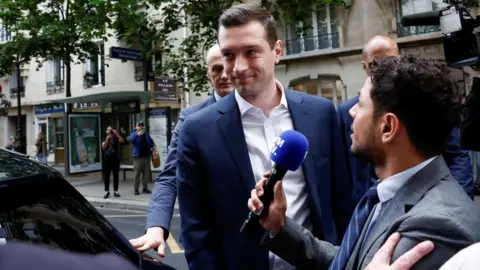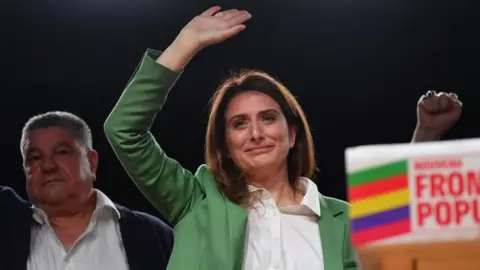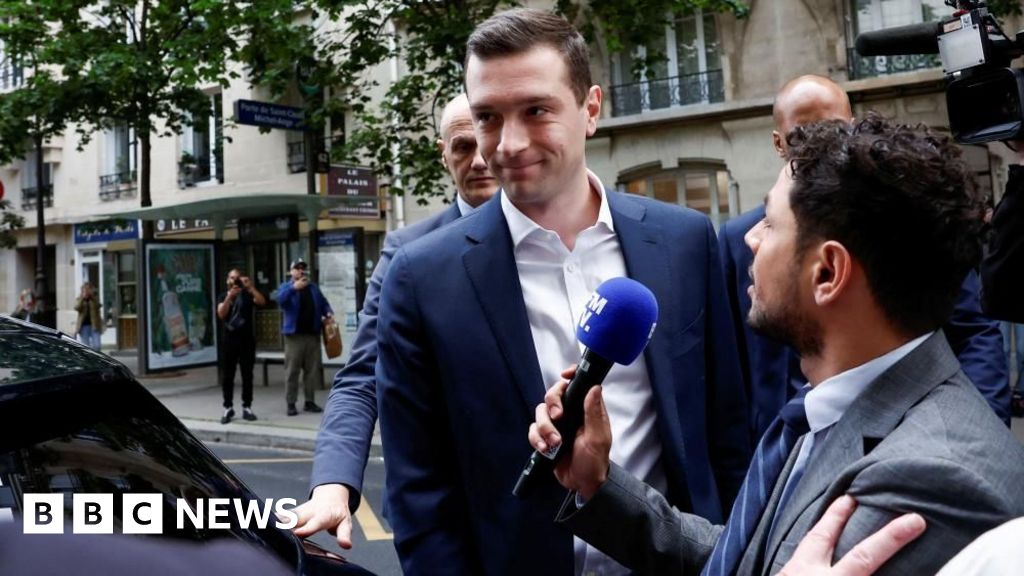By Paul Kirby, BBC News in Paris
 REUTERS/Benoit Tessier
REUTERS/Benoit TessierFrance’s political rivals barely had time to digest the results of National Rally (RN)’s election success, before they had to kick-start a new campaign for the final vote.
The anti-immigration party secured one in three votes in the first round of parliamentary elections. They have now set their sights on winning an absolute majority.
RN leader Jordan Bardella, who hopes to be France’s next PM, appealed to voters to make a choice between a left-wing alliance he called “an existential threat to the French nation” and a party of patriots ready to leap into action.
PM Gabriel Attal, who may be days from losing his job, says the stakes are clear – to stop the far right winning an absolute majority.
Emmanuel Macron, who called the election and propelled France into political crisis, still has three years as president and has vowed not to resign.
But the centrist movement he founded came only third in the first round and now finds itself eclipsed by a left-wing alliance called New Popular Front, as well as the National Rally of Marine Le Pen and Jordan Bardella.
Of the 577 seats in the National Assembly, RN needs 289 to form an absolute majority and put through its programme on immigration, law and order, and tax cuts.
It wants to restrict social welfare to French citizens, abolish the automatic right to French citizenship – droit du sol – for people who came to France as children, and prevent 3.5 million people with dual citizenship from holding sensitive, strategic jobs.
 JULIEN MATTIA/EPA-EFE
JULIEN MATTIA/EPA-EFERN and its allies already have 38 confirmed seats, won outright with more than half the local vote in Sunday’s first round. The Popular Front have 32 and the Macron alliance just two, an indication of how far behind the governing party has fallen.
Another 501 seats have yet to be decided and the big three party blocs have big decisions to make within the next 24 hours.
Candidates who have qualified for Sunday’s second round for the Macron camp or the Popular Front now have until 18:00 on Tuesday to decide whether or not to withdraw, to maximise the chances of a political rival defeating National Rally.
Both the Popular Front and the Macron Ensemble camp have pleaded with voters not to vote for the far right.
But tensions between the two burst out into the open on Monday, an indication of the high stakes of this election and the intensity of such a brief campaign.
Greens leader Marine Tondelier was on the verge of tears during a radio interview, when she reacted angrily to a Macron minister’s call not to back the biggest party in the left-wing alliance.
Finance Minister Bruno Le Maire had said moments earlier that voters should steer clear of France Unbowed, whose critics denounce it as extremist, as much as they should not vote for Mr Bardella’s party.
Ms Tondelier said for 10 years she had lived in a town held by National Rally’s Marine Le Pen, and that the Macron alliance had misunderstood the issue and had chosen dishonour and cowardice.
“Does National Rally have a chance of winning an absolute majority in the National Assembly? The answer is yes. Is France Unbowed in the position of winning an absolute majority, the answer is no.”
What is so unusual about this election is that more than 300 of the local races are run-offs between three candidates.
Sunday’s turnout of 66.7% was the highest since 1997, which meant more candidates than ever qualified for the second round.
But by Monday afternoon a large number of third-placed candidates had pulled out of the race, according to Le Monde, including those standing for Ensemble and the individual parties in the Popular Front.
One of RN’s leading figures, Sébastien Chenu, said he was confident that even if his party did not reach the 289 seats it would succeed in “finding supporters” in the new National Assembly.
He said there might be MPs keen on preventing the Assembly from becoming blocked, and if that was possible “we will assume our responsibilities before the French people”.


